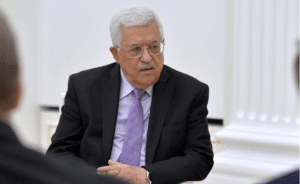The West Bank barrier that runs along the Green Line and inside the West Bank (source: Wikimedia Commons)
Israel announced the delay of the implementation of new regulations for foreigners entering the West Bank, after international backlash. The regulations required, among other things, that foreigners notify Israeli authorities of their relationship with a Palestinian within 30 days after the onset of the romance. In addition to the delay, COGAT, the unit in the Israeli Ministry of Defense that is responsible for coordinating civilian issues between the Government of Israel and the Palestinian Authority, has amended several of the restrictions. Many other regulations remain, however.
“Cooling off” period
The 97-page COGAT order was first published in February, titled “Procedure for entry and residence of foreigners in the Judea and Samaria area”. It was originally set to be implemented on Monday September 12.
The original rules also stipulated that foreign spouses of Palestinians would be granted permits of only three or six months, which in many cases then demanded them to leave the West Bank for half a year. Moreover, the original restrictions imposed a “cooling off” period on foreigners married to Palestinians, after 27 months of marriage, which forced them to leave the West Bank for lengthy periods. None of the rules would apply to foreigners entering Israel, or the more than 130 illegal settlements scattered over the West Bank.
Widespread criticism
The regulations received widespread criticism, with critics arguing that they merely enshrined Israel’s control over Palestinians in the West Bank. Palestinian and Israeli legal experts and rights groups expressed outrage over the draft. HaMoked, an Israeli human rights group, has filed a petition to the High Court, challenging the rules. In July, the High Court rejected the petition, saying it was “premature”, since COGAT still had to reach a final decision on them. The U.S. Ambassador to Israel, Tom Nides, said on Twitter that he had “aggressively engaged” with Israel on the draft and that he continued to “have concerns” about the regulations. The PLO, the official representative of the Palestinian people, commented on the initial draft that it brings in “apartheid regulations that impose a reality of one state and two different systems.” COGAT has not responded to the criticism. Israel authorities claim that the regulations are necessary for security reasons.
Cosmetic changes
The new changes appear to be mostly cosmetic. Despite dropping some of the most controversial rules from the original draft, COGAT still continues to hold great control over who is allowed to enter the West Bank and who is not. Spouses of Palestinians can be asked to pay a deposit of some 70.000 shekels (more than €20.000), to make sure they will leave the West Bank. Also, a COGAT official has the ultimate say on whether a marriage is “sincere and genuine”. Furthermore, restrictions on the entry of foreign students and lecturers are still in place, though the limit on the number of foreign students and lecturers has been dropped. For example, COGAT continues to hold the authority to screen incoming students on whether there is “suspicion of misuse” of a visa.
Israel captured the West Bank, together with East Jerusalem and the Gaza Strip, in the 1976 Mideast War. Today, Israel continues to expel Palestinians in the occupied territories from their lands, which Israeli settlers often take over.
Sources: Al Jazeera 1, Al Jazeera 2, BBC, The Washington Post
Photo: Wikimedia Commons



